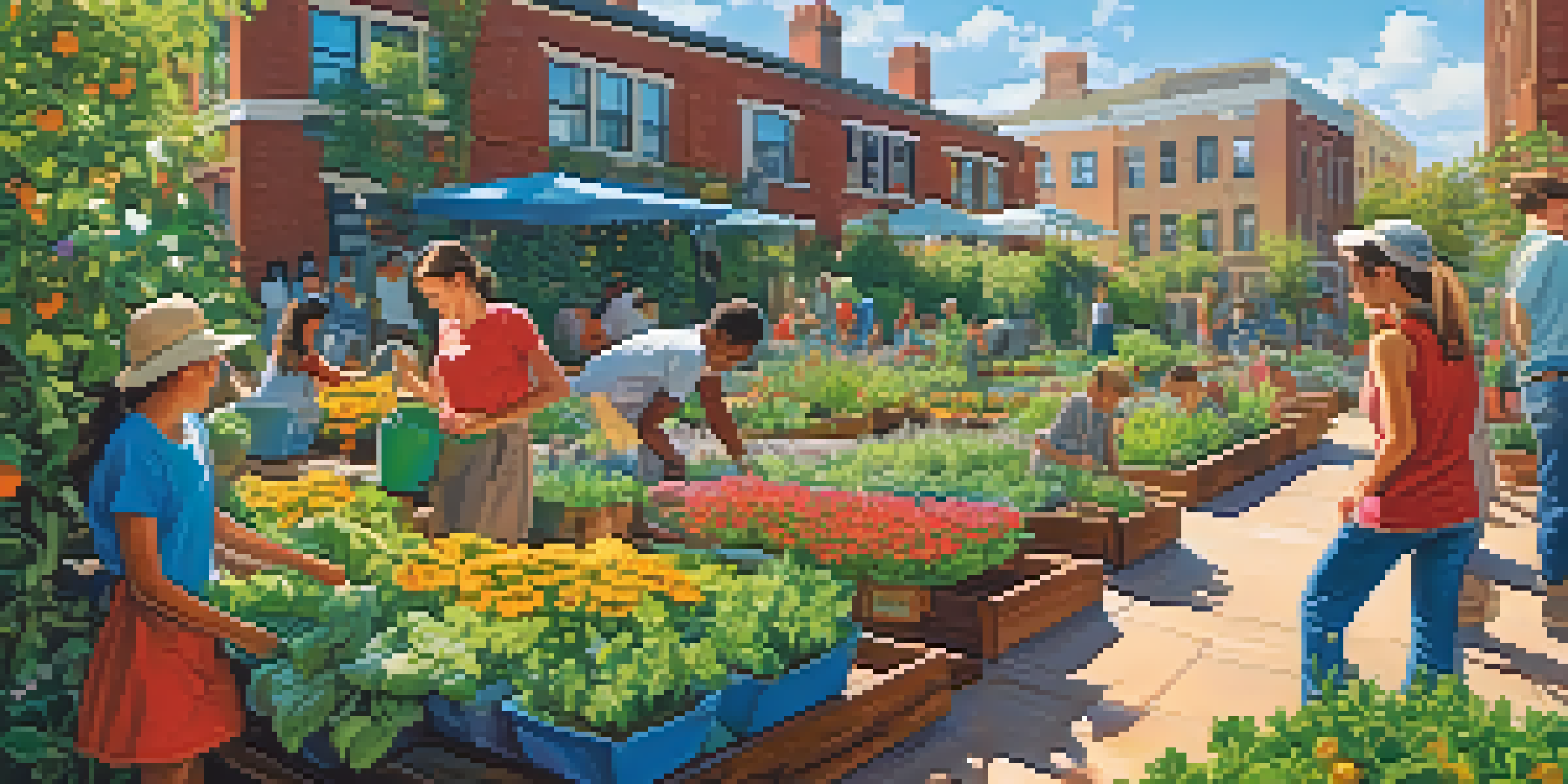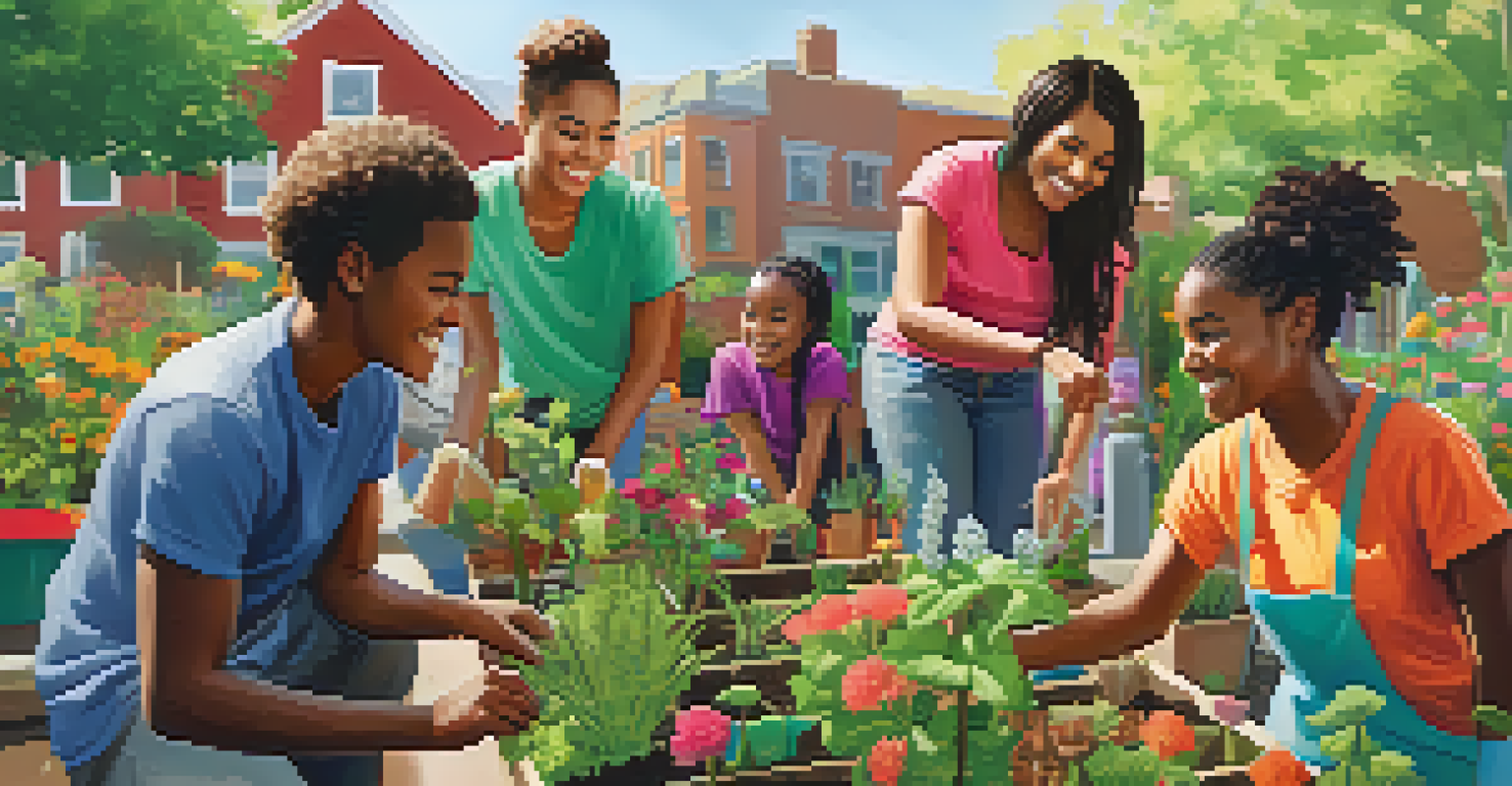Engaging Youth in Urban Gardening Initiatives in Scottsdale

The Importance of Urban Gardening for Youth
Urban gardening is more than just a trend; it's a meaningful way for youth to connect with nature and learn about sustainability. Engaging in gardening allows young people to witness the growth cycle of plants firsthand, fostering a sense of responsibility and care. Additionally, it provides a tangible way to tackle issues like food insecurity and environmental awareness, which are crucial in today's world.
Gardening adds years to your life and life to your years.
Youth involvement in urban gardening initiatives can also serve as a therapeutic outlet. Many young people face stress and anxiety, and spending time in a garden can be a calming activity that promotes mental well-being. This hands-on experience can encourage them to develop patience, as they learn that growth takes time and effort.
Moreover, urban gardening cultivates a sense of community. When youth work together on gardening projects, they build friendships and learn valuable teamwork skills. These connections can strengthen their sense of belonging in their neighborhoods and encourage a more engaged, active lifestyle.
Community Programs Supporting Urban Gardening
In Scottsdale, various community programs are tailored to engage youth in urban gardening. Organizations like local parks and recreation departments often host workshops where young people can learn about planting, maintenance, and harvesting. These programs not only impart knowledge but also inspire creativity as participants design their own garden spaces.

Schools in the area are also getting involved by incorporating gardening into their curriculums. By integrating hands-on gardening projects into science or health classes, educators can make learning more interactive and relevant. Students gain practical skills while understanding the importance of nutrition and sustainability.
Urban Gardening Enhances Youth Skills
Engaging in urban gardening equips youth with vital skills like responsibility and teamwork while fostering creativity and problem-solving.
Additionally, partnerships with local businesses and nonprofits can enhance these initiatives. Sponsorships for community gardens or funding for educational materials help ensure that these programs are accessible to all youth, regardless of their economic background.
Benefits of Gardening for Local Ecosystems
Engaging youth in urban gardening not only impacts their personal growth but also benefits local ecosystems. When young people plant native species, they contribute to biodiversity, which is essential for a healthy environment. These plants provide habitats for various wildlife, including pollinators like bees and butterflies, which are crucial for maintaining ecological balance.
The best time to plant a tree was twenty years ago. The second best time is now.
Furthermore, urban gardens can help mitigate urban heat islands, a phenomenon where cities become significantly warmer than surrounding areas. By incorporating greenery into urban spaces, gardens can lower temperatures and improve air quality, making cities more livable. This emphasizes the role of youth as active participants in combating climate change.
As young gardeners learn about sustainable practices, they become advocates for environmental stewardship. This knowledge not only empowers them but also encourages their families and peers to adopt eco-friendly habits, creating a ripple effect that extends beyond the garden.
Encouraging Creativity Through Gardening
Gardening is an excellent avenue for fostering creativity among youth. It allows them to express themselves through design, from choosing plant varieties to arranging garden layouts. This creative freedom can lead to innovative ideas and solutions, reflecting their unique perspectives on the world around them.
Moreover, urban gardening projects can incorporate art, such as painting garden signs or creating murals that represent the community. This blend of art and gardening not only beautifies the space but also engages youth in a multidimensional learning experience. It promotes collaboration as they work together to enhance their gardens aesthetically.
Community Support Drives Gardening
Collaboration among local governments, schools, and businesses is essential for creating sustainable urban gardening programs that benefit youth.
Ultimately, allowing youth to explore their creativity through gardening can instill a sense of pride in their work. When they see their ideas come to life, it boosts their confidence and encourages them to take on new challenges, both in and out of the garden.
Building Lifelong Skills Through Gardening
Participating in urban gardening equips youth with a variety of lifelong skills. From basic gardening techniques to time management and problem-solving, these experiences prepare them for future endeavors. For instance, learning how to care for plants teaches responsibility, while managing a garden project enhances organizational skills.
Additionally, urban gardening encourages young people to develop a strong work ethic. The process of planting, nurturing, and harvesting requires dedication and perseverance. These qualities are invaluable as they transition into adulthood and face various challenges in their personal and professional lives.
Furthermore, gardening can introduce youth to potential career paths in agriculture, environmental science, or culinary arts. Exposure to these fields can spark interest and lead to further education and opportunities, shaping their future positively.
Creating Partnerships for Sustainable Initiatives
To ensure the success of youth urban gardening initiatives, collaboration is key. Local governments, schools, businesses, and nonprofits can come together to create a supportive network. By pooling resources and expertise, they can develop comprehensive programs that meet the needs of young gardeners and the community at large.
Partnerships can also facilitate access to necessary tools and materials. For instance, local hardware stores could provide discounts on gardening supplies, or community gardens could offer shared equipment. This cooperation makes gardening more accessible and encourages greater participation among youth.
Gardening Promotes Environmental Awareness
Involvement in urban gardening encourages youth to become advocates for environmental stewardship, positively impacting their communities.
Moreover, engaging community members in these initiatives fosters a sense of ownership. When everyone contributes to the success of urban gardening projects, it builds a stronger community identity and encourages ongoing involvement in sustainability efforts.
The Future of Urban Gardening in Scottsdale
Looking ahead, the future of urban gardening in Scottsdale seems promising. As awareness of the benefits of gardening continues to grow, more youth are likely to get involved in these initiatives. This trend can lead to a stronger emphasis on sustainability and environmental consciousness among the younger generation.
Innovative technologies, such as vertical gardens and hydroponics, could also play a significant role in urban gardening. By integrating these modern techniques, youth can learn about advanced gardening methods that maximize space and resources, fostering a new wave of environmentally-friendly practices.

Ultimately, engaging youth in urban gardening not only enriches their lives but also contributes to the overall well-being of the community. By nurturing a love for gardening, Scottsdale can cultivate a generation of environmentally conscious leaders who are committed to creating a sustainable future.